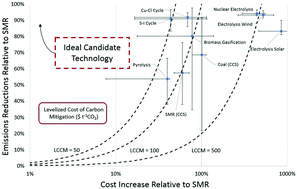Levelized cost of CO2 mitigation from hydrogen production routes†
Abstract
Different technologies produce hydrogen with varying cost and carbon footprints over the entire resource supply chain and manufacturing steps. This paper examines the relative costs of carbon mitigation from a life cycle perspective for 12 different hydrogen production techniques using fossil fuels, nuclear energy and renewable sources by technology substitution. Production costs and life cycle emissions are parameterized and re-estimated from currently available assessments to produce robust ranges to describe uncertainties for each technology. Hydrogen production routes are then compared using a combination of metrics, levelized cost of carbon mitigation and the proportional decarbonization benchmarked against steam methane reforming, to provide a clearer picture of the relative merits of various hydrogen production pathways, the limitations of technologies and the research challenges that need to be addressed for cost-effective decarbonization pathways. The results show that there is a trade-off between the cost of mitigation and the proportion of decarbonization achieved. The most cost-effective methods of decarbonization still utilize fossil feedstocks due to their low cost of extraction and processing, but only offer moderate decarbonisation levels due to previous underestimations of supply chain emissions contributions. Methane pyrolysis may be the most cost-effective short-term abatement solution, but its emissions reduction performance is heavily dependent on managing supply chain emissions whilst cost effectiveness is governed by the price of solid carbon. Renewable electrolytic routes offer significantly higher emissions reductions, but production routes are more complex than those that utilise naturally-occurring energy-dense fuels and hydrogen costs are high at modest renewable energy capacity factors. Nuclear routes are highly cost-effective mitigation options, but could suffer from regionally varied perceptions of safety and concerns regarding proliferation and the available data lacks depth and transparency. Better-performing fossil-based hydrogen production technologies with lower decarbonization fractions will be required to minimise the total cost of decarbonization but may not be commensurate with ambitious climate targets.



 Please wait while we load your content...
Please wait while we load your content...